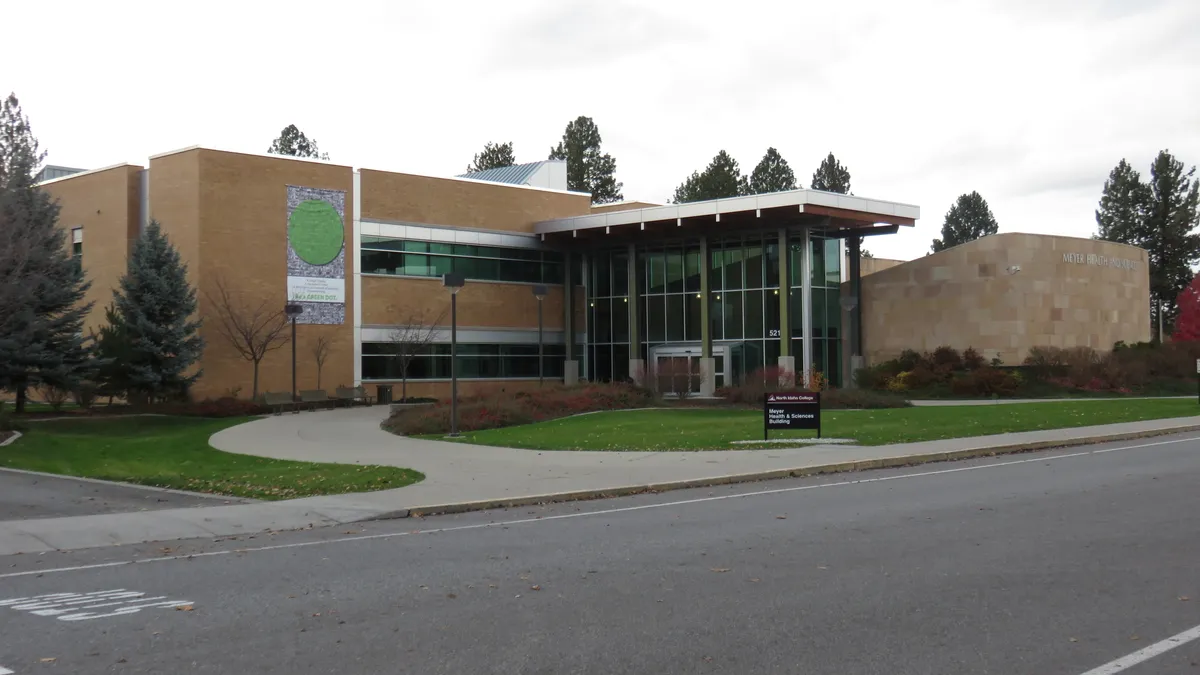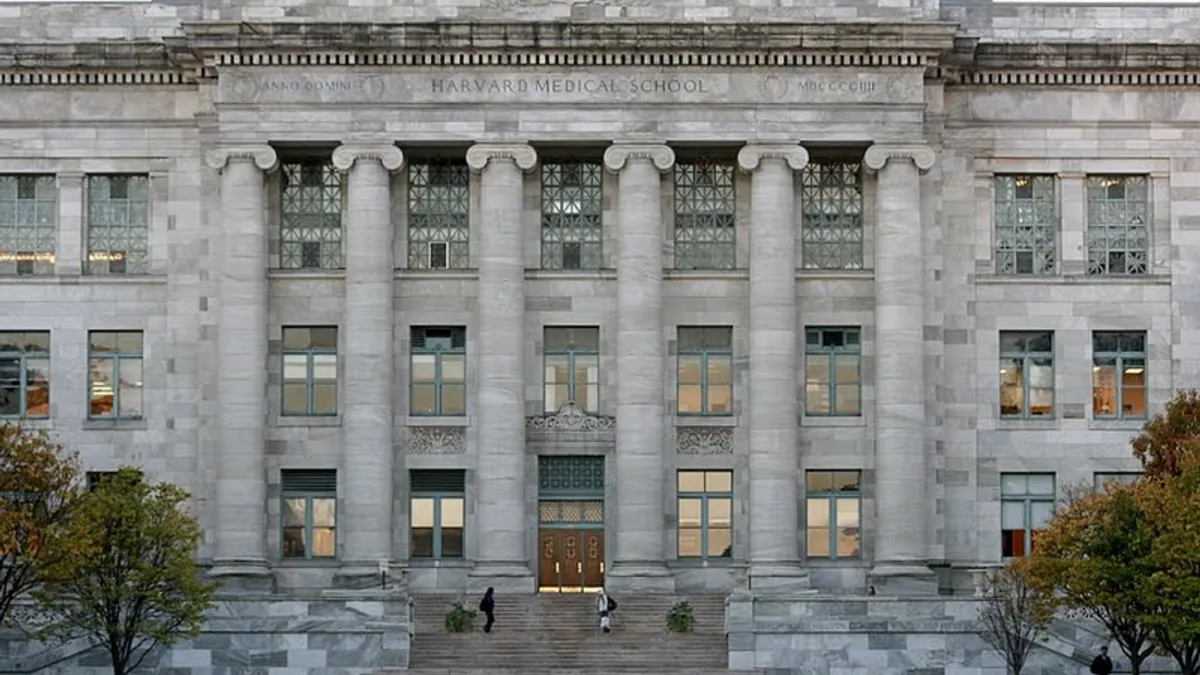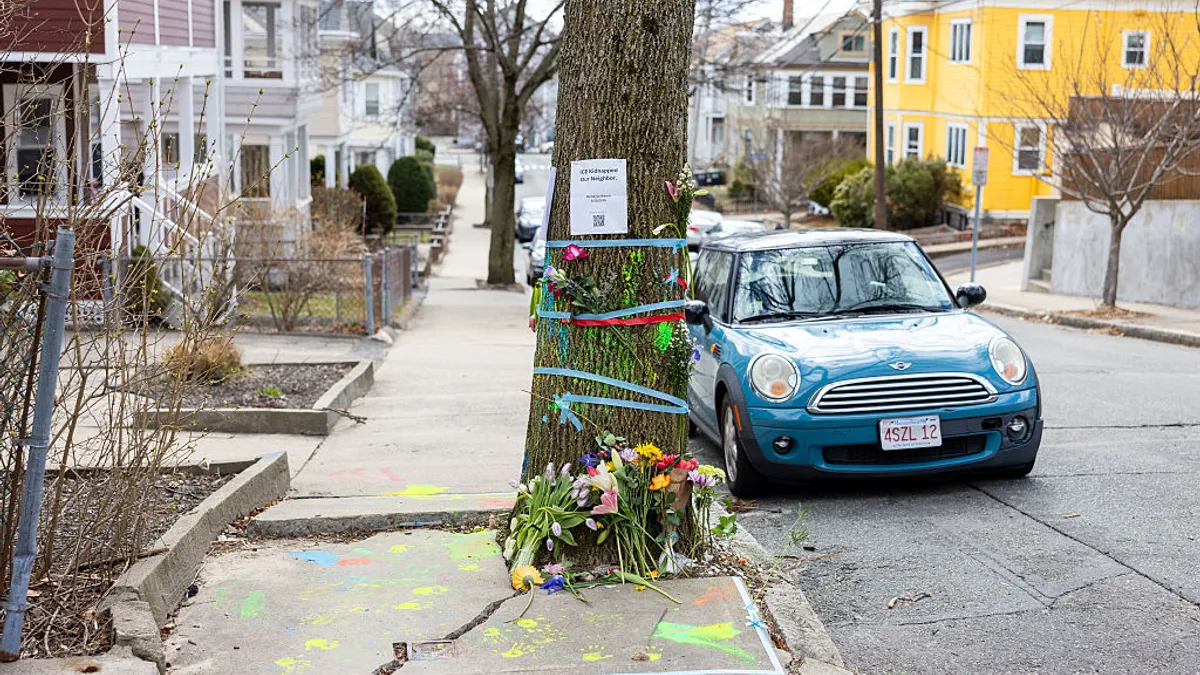Nick Swayne is the president of North Idaho College. He’s been president of the Coeur d’Alene community college since March 2023 — or, depending on your perspective, since August 2022.
That discrepancy is because Swayne was placed on administrative leave for undisclosed reasons by the college’s trustee board in December 2022 and replaced with an interim president. Then, he sued the board to get his job back.
“I came here to be the president, not sit in my house and collect a paycheck,” he said in an interview.
Swayne’s personal saga is just one aspect of the dysfunction that has been plaguing North Idaho College’s board and has threatened its accreditation. Multiple lawsuits over the board’s behavior, along with no-confidence votes from college employees and frequent turnover in leadership, also caught the eye of the institution’s accreditor, the Northwest Commission on Colleges and Universities.
The NWCCU has placed the North Idaho College on show-cause order — the last step before the agency can pull accreditation — and has given officials until April 2025 to fix key issues.
Losing accreditation is a death sentence for most colleges, which rely on this seal of approval to receive federal financial aid. More than one-third of the college’s students, 38%, received Pell Grants in the 2021-22 academic year, and 28% received federal student loans, according to government data.
However, Swayne and others say the campus community is cautiously optimistic that the college will be able to overcome its past to remain an accredited anchor institution in northern Idaho.
A culture war unfolds
Over the past year, North Idaho College was sanctioned by its accreditor, had its debt downgraded over “governance and management dysfunction,” and was ordered by a court to reinstate Swayne. The institution has also been juggling lawsuits, including the board’s appeal of Swayne’s case.
The cost of lawyers, board training and administrative leave payments has reached tens of thousands of dollars.
Many in the North Idaho College community say the issues that have brought the institution to this point are, at their core, ideological. The situation has drawn comparisons to that at the New School of Florida, where staunch conservatives have sought to remake the institution by pushing back against “woke” doctrine.
In November 2020, nonpartisan elections for North Idaho College trustee positions ended with a political bloc of conservatives taking the majority. Only a few months later, local human rights task forces sent a complaint to the college’s accreditor, asking for an investigation.
One of the organizations — the Kootenai County Task Force on Human Relations —formed in the 1980s, when the Aryan Nations used Kootenai County, Idaho, as its headquarters. But in 2021, the task force instead took aim at the chair of North Idaho College’s governing board, a member of the Republican bloc named Todd Banducci. The task forces accused Banducci of aggressive behavior and of stifling academic freedom.
He had told a student via email that he hoped to help with getting a grade changed that the student received over a class presentation on abortion.
“I'm battling the NIC ‘deep state’ on an almost daily basis,” Banducci wrote in an email to a student in January 2021. “The liberal progressives are quite deeply entrenched.”
In response to an emailed request for comment, Banducci wrote, “I won’t give credence to the various fabrications, falsehoods, & fictions that have been viciously used against me.” Other board members did not respond to requests for comment.
In September 2021, the board voted to fire then-President Rick MacLennan without cause. No stated reason was given for the dismissal, but trustees had bristled at MacLennan’s decisions to implement mask mandates in response to the COVID-19 pandemic.
Shortly after, the board promoted North Idaho College’s wrestling coach, Michael Sebaaly, who has a doctorate in educational leadership, to interim president.
According to MacLennan, his firing spurred an exodus of top officials.
“The college was probably in the best shape it's ever been in,” said MacLennan, who is now chancellor at Ventura County Community College District in California. “It is the best executive leadership team I’ve ever been a part of. Within a couple months of me leaving, everybody left.”
By the end of 2022, the board had both hired a brand new president, Swayne, and placed him on leave.
This past fall, however, North Idaho College argued to its accreditor that it has made substantial progress in filling senior leadership positions, including by reinstating Swayne.
Fighting to survive
Peter Eckel, co-director of the University of Pennsylvania’s Project on University Governance, said it’s uncommon for poor governance to reach the point where it threatens accreditation. But dysfunction can seriously limit an institution’s ability to thrive.
“There’s an important relationship between the board and the president, and at North Idaho that was never established,” Eckel said. “Institutions can survive many things, but they can’t survive bad governance.”
In September, North Idaho College said it was working with the Association of Community College Trustees to train the board and help its members improve governance. For instance, ACCT has advised the trustees to comply with a “no surprises” rule when they meet.
Still, the battle around the board and accreditation has had far-reaching effects on the college. The academics and finances of North Idaho College are sound, Swayne said, but the threat of accreditation loss has exacerbated declining enrollment. Enrollment dropped from 6,565 students in fall 2012 to 4,296 a decade later, a nearly 35% decline.
However, enrollment of first-time degree seeking students is up 19% this spring from last year.
The college’s boosters say accreditation loss would cripple not only the college, but the businesses and organizations that rely on the institution.
“With the loss of accreditation, we believe, based on data, that it could be a $60 million hit to our local community,” said Christa Hazel, a member of the Save NIC nonprofit organization. Hazel is an alum of North Idaho College and was student body president during her time there. “I get the sense NWCCU is literally building the airplane in the air on how to handle a board that is hell-bent on a political agenda.”
The accreditation issue has been an unrelenting challenge for staff, Swayne said, but the college is still focused on its bread and butter, like nursing programs and transfer initiatives.
“We’re going to turn this place into a phenomenal facility for North Idaho,” he said. “Everybody recognizes we’ve got to do some things to get back on top.”
An issue beyond North Idaho College
Accreditation has become an increasingly hot-button issue in higher education culture wars. In June, after an accreditor had run-ins with certain public universities in Florida, Republican Gov. Ron DeSantis sued the Department of Education, challenging the federal law that requires colleges to be approved by independent accrediting agencies.
“I will not allow Joe Biden’s Department of Education to defund America’s #1 higher education system all because we refuse to bow to unaccountable accreditors who think they should run Florida’s public universities,” DeSantis said in a press release.
Recent actions by North Idaho College’s board show that politics are still front and center in its fight for accreditation.
To work with the accreditor, the board hired a lawyer who has appeared on far-right media and expressed extremist views on child protective services, The Spokesman-Review reported. He scored a 60% on the college’s own personal assessment, while the next competitor scored a 97% and would have charged the same hourly amount.
However, the Kootenai Journal, a conservative news publication, has suggested that there is not, and never has been, any real danger of the NWCCU pulling accreditation.
Charity Joy, editor in chief of the publication, also suggested that the media had misconstrued the issues around North Idaho College and that progressive activists had triggered the accreditation saga.
“If governing educational institutions is supposed to be nonpartisan, why do those in education only want those who are favorable to progressive ideology on the governing body?” Joy wrote.





















